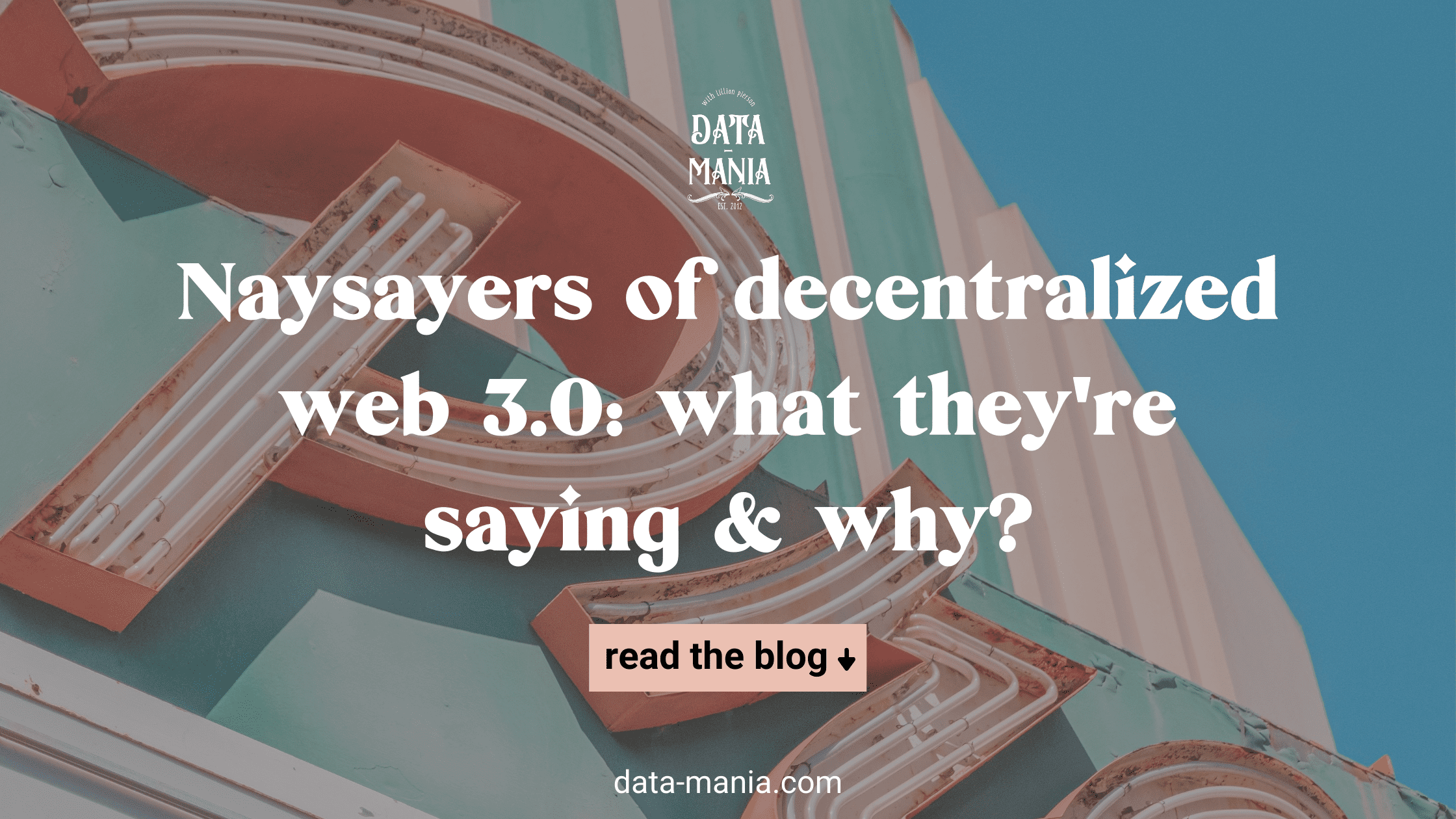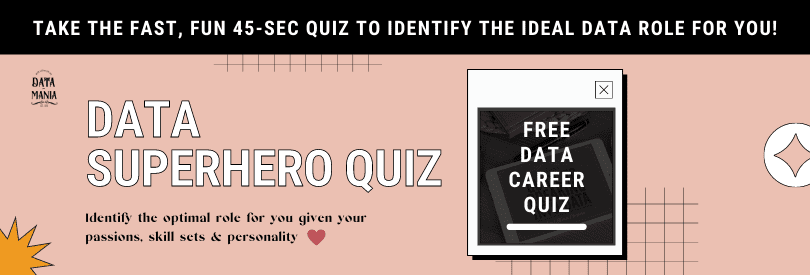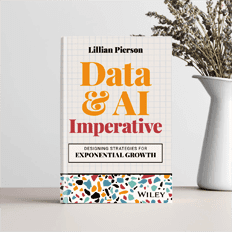If you’re like most data professionals, you are still scratching your head about the decentralized web, or “Web 3.0”. You are also thinking about whether it’s really here to stay. And while the buzz about decentralized web has been heating up lately, it has included quite a bit of criticism. These criticisms are from some big names in both data and tech. The likes of Elon Musk and former Twitter CEO Jack Dorsey have spoken out online about their skepticism of Web 3.0. They were questioning its legitimacy as well as the people who are really behind it. Where do these concerns stem from, though? The answer lies in the intended purpose of the decentralized web.
Curious? Read on…

What is Decentralized Web 3.0?
Web 3.0 is the latest iteration of the Internet. Existing roughly from 1990 until 2000, Web 1.0, was primarily basic HTML webpages with little interactivity. Web 2.0 is the Internet as we have known throughout the 2000s and 2010s. Google and Facebook, the world’s biggest tech companies, centralize and control Web 2.0. Web 3.0 aims to give ownership of the Internet back to the masses and make it a community-controlled space, much like it was in the 1990s. This is decentralization and it stems from cryptocurrency.
Cryptocurrencies are run through a public ledger managed by millions of individuals around the world, known as the blockchain. Various currencies are run slightly differently. But the biggest players in crypto today, such as Etherum, are built on blockchain technology. No banks, middlemen, corporations, or financial institutions get to control decentralized finance. It is all in the hands of individuals. This can be both an advantage and a weakness. But the ideology behind decentralized finance and cryptocurrencies is a major force behind the decentralized web.
True Decentralization
Former Twitter CEO Jack Dorsey is a proponent of decentralization but a critic of Web 3.0. His reasoning highlights one of the most substantial concerns that is growing around Web 3.0. Dorsey has pointed out that the decentralized web will never actually exist. That’ll happen as long as venture capitalists, limited partnerships, and other corporate entities are funding Web 3.0 projects.
You don’t own “web3.”
The VCs and their LPs do. It will never escape their incentives. It’s ultimately a centralized entity with a different label.
Know what you’re getting into…
— jack⚡️ (@jack) December 21, 2021
The problem is that as long as these powerful corporate parties are funding the decentralized web, they can impose regulations and restrictions on developers. These motions could force developers to do things that go against the philosophy of the decentralized web. For example, a corporate sponsor may want to collect data on users which they could sell without a user’s knowledge or permission. This is one of the greatest issues with Web 2.0, which the decentralized web aims to solve.
A Question of Security with Decentralized Web
 One of the oldest and most common concerns with cryptocurrency is vulnerability to hackers. The same concerns extend to Web 3.0 on an even larger scale. This is a direct result of the decentralized nature of Web 3.0 and crypto. When everyone is running a currency, for example, and everyone can see every transaction ever made, how is that data protected?
One of the oldest and most common concerns with cryptocurrency is vulnerability to hackers. The same concerns extend to Web 3.0 on an even larger scale. This is a direct result of the decentralized nature of Web 3.0 and crypto. When everyone is running a currency, for example, and everyone can see every transaction ever made, how is that data protected?
Security essentially falls into the hands of individuals. Some see this as a necessary benefit. Those familiar with cybersecurity regulations and best practices are used to creating their own digital security measures. They know their rights and the methods they can use to keep hackers out of their data and devices. However, for most people cybersecurity is a complicated concept that they leave to antivirus software developers. The skyrocketing rates of phishing attacks are proof enough that the average Internet user is vulnerable to cyber-attacks.
Would a decentralized web really be better for most people? Centralization puts control in the hands of a few powerful entities, but a centralized system can also provide some measure of standardized protection over users. A decentralized web would be essentially unregulated, which makes security a far greater issue.
Decentralized Web – Issues With Blockchain
While Elon Musk’s Tweets about Web 3.0 have been less thorough than those of Jack Dorsey, his actions related to the decentralized web reveal at least one major concern. The Tesla CEO made headlines in May of 2021 when he abruptly halted Tesla’s acceptance of Bitcoin as a form of payment for the company’s popular electric cars. Musk explained in a Twitter thread that the decision was due to the massive environmental impact of Bitcoin mining.
Musk’s announcement draws attention to a major issue with blockchain and decentralization. Bitcoin mining is essentially the process of verifying Bitcoin transactions. “Miners” all over the world do this by running extremely high-power computers that solve complex puzzles to validate transactions in blockchain. These computers draw monumental quantities of energy, most of which comes from fossil fuels, which are detrimental to the environment. Today, Bitcoin consumes hundreds of terawatt hours of electricity.
If the decentralized web is going to be run in a similar fashion, built on blockchain and the processing power of billions of computers, sustainability needs to be addressed. The emissions and carbon footprint of blockchain today will not be sustainable in the long term, certainly not long enough for Web 3.0 to truly become a reality.
Web 3.0: Innovation or Buzzword?
The decentralized web is on the verge of being an innovation in data privacy, but Web 3.0 is in many ways a failed attempt to achieve that. Funding remains a threat to true decentralization. Moreover, security and sustainability shortcomings have crippled the adoption of the technology itself. Once these core issues can be solved, though, the decentralized web could become the future of the Internet, one where users have control over their own data and can truly browse freely.
More To Explore…
If we’ve got you scratching your head with all this talk on Web 3, we invite you to uncover your most high-potential data superpower by taking our free Data Superhero Quiz. It’s a fun, 45-second experience that will show you the most powerful data career path for you given your skillsets, passions, and personality.
Also, I’d like to encourage you to save your seat for our upcoming Story Hour, live on LinkedIn – March 9, 10 am ET, where our former client, Stephen Taylor, will share the exciting story of how he sold his data consulting business to work as a CIO for Vast Bank, where he launched the first ever Crypto Bank in the United States!
Hey! If you liked this post, I’d really appreciate it if you’d share the love by clicking one of the share buttons below!
A Guest Post By…

This blog post was generously contributed to Data-Mania by Shannon Flynn. Shannon Flynn is a freelance blogger who covers business, cybersecurity and IoT topics.
You can follow Shannon on Muck Rack or Medium to read more of her articles.
If you’d like to contribute to the Data-Mania blog community yourself, please drop us a line at communication@data-mania.com.







